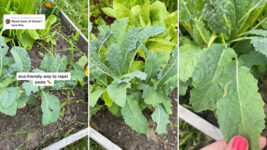
‘As early as 10,000 years ago’
If your garden is getting eaten by worms or other insects, you don’t necessarily have to jump straight to toxic pesticides to solve the problem. One sustainability content creator recently shared a tip with their followers about how to control pests naturally and enhance your garden at the same time.
“Here’s an eco-friendly way to repel pests,” Sabrina (@sabrina.sustainable.life) told her followers. “[You can] plant herbs in your garden. This is because many herbs have a strong aroma and make them a great companion plant for natural pest control. I planted some thyme next to my kale and I’m hoping it will keep the pests away for good.”
@sabrina.sustainable.life Reply to @newlifestyle here’s an eco-friendly way to repel pests in your garden 🐛 #gardening #gardening101 #naturalgardening #pests #ecofriendly ♬ Running Up That Hill (A Deal With God) – Kate Bush
Sabrina suggested other herbs you can plant to deter pests, including basil, lemongrass, mint, lavender, and rosemary.
There is science to back up Sabrina’s assertion. According to a study published in a 2018 issue of Frontiers in Plant Science, “Several hundred candidate plant species and compounds are now known to have pesticidal properties against a range of arthropod pest species.”
“You can find examples of pesticide plants stretching back thousands of years,” Popular Science reports. “Native Americans, for example, may have developed companion planting as early as 10,000 years ago, long before home gardening became a pastime. Although synthetic chemical-based pesticides have become common, you don’t need to follow that trend.”
Growing your own food can be a great way to save money, eat healthier, and minimize your pollution footprint by relying less on mass-produced, globally-shipped crops. Avoiding toxic pesticides is definitely the way to go, as they are harmful to the environment, unhealthy for humans, and ineffectively regulated by the government.
Sabrina’s TikTok followers were grateful for the advice.
“I remember my grandpa mentioning this. Definitely the way to go!” wrote one commenter.
“This is so helpful thank you!” wrote another.
Although some complained that the pests had eaten their mint plants, too.
“My bugs ate my mint like what?!” one wrote.
Join our free newsletter for easy tips to save more, waste less, and help yourself while helping the planet.



